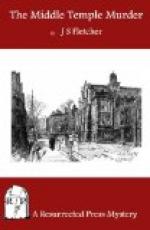Rathbury put his thumbs in the armholes of his waistcoat and, leaning back in his chair, shook his head.
“Frankly, I haven’t,” he replied. “Of course, there’s a lot being done in the usual official-routine way. We’ve men out making various enquiries. We’re enquiring about Marbury’s voyage to England. All that we know up to now is that he was certainly a passenger on a liner which landed at Southampton in accordance with what he told those people at the Anglo-Orient, that he left the ship in the usual way and was understood to take the train to town—as he did. That’s all. There’s nothing in that. We’ve cabled to Melbourne for any news of him from there. But I expect little from that.”
“All right,” said Spargo. “And—what are you doing—you, yourself? Because, if we’re to share facts, I must know what my partner’s after. Just now, you seemed to be—drawing.”
Rathbury laughed.
“Well, to tell you the truth,” he said, “when I want to work things out, I come into this room—it’s quiet, as you see—and I scribble anything on paper while I think. I was figuring on my next step, and—”
“Do you see it?” asked Spargo, quickly.
“Well—I want to find the man who went with Marbury to that hotel,” replied Rathbury. “It seems to me—”
Spargo wagged his finger at his fellow-contriver.
“I’ve found him,” he said. “That’s what I wrote that article for—to find him. I knew it would find him. I’ve never had any training in your sort of work, but I knew that article would get him. And it has got him.”
Rathbury accorded the journalist a look of admiration.
“Good!” he said. “And—who is he?”
“I’ll tell you the story,” answered Spargo, “and in a summary. This morning a man named Webster, a farmer, a visitor to London, came to me at the office, and said that being at the House of Commons last night he witnessed a meeting between Marbury and a man who was evidently a Member of Parliament, and saw them go away together. I showed him an album of photographs of the present members, and he immediately recognized the portrait of one of them as the man in question. I thereupon took the portrait to the Anglo-Orient Hotel—Mrs. Walters also at once recognized it as that of the man who came to the hotel with Marbury, stopped with him a while in his room, and left with him. The man is Mr. Stephen Aylmore, the member for Brookminster.”
Rathbury expressed his feelings in a sharp whistle.
“I know him!” he said. “Of course—I remember Mrs. Walters’s description now. But his is a familiar type—tall, grey-bearded, well-dressed. Um!—well, we’ll have to see Mr. Aylmore at once.”
“I’ve seen him,” said Spargo. “Naturally! For you see, Mrs. Walters gave me a bit more evidence. This morning they found a loose diamond on the floor of Number 20, and after it was found the waiter who took the drinks up to Marbury and his guest that night remembered that when he entered the room the two gentlemen were looking at a paper full of similar objects. So then I went on to see Mr. Aylmore. You know young Breton, the barrister?—you met him with me, you remember?”




